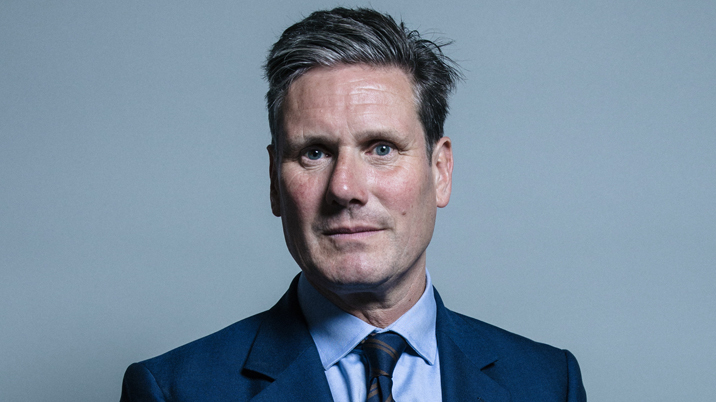
The Trump playbook
If you are the head of an organisation where things don’t go quite as they should, to what extent is the responsibility yours? Clearly, if you are personally involved in the decision-making process or encourage or condone the approach, then you must carry the can. But what if you are only vaguely aware of what’s going on or have nothing at all to do with the questionable decisions? Are you still culpable because you should have a handle on everything?
I ask these questions, not in relation to the Prime Minister, but to the Leader of the Opposition. Under fire from all sides in the Commons on Monday, Boris Johnson accused Keir Starmer of having spent his time as Director of Public Prosecutions, “prosecuting journalists and failing to prosecute Jimmy Savile”. This had the effect of moving into the mainstream a slur that had previously found traction only among social media trolls. It was a prepared attack that came straight out of the Trump playbook – as someone tweeted yesterday “It’s like the Barak Obama birth certificate all over again” – inviting scrutiny of an opponent for a non-existent failing to deflect from scrutiny of oneself.
The Speaker did not pull up the Prime Minister at the time, but did so the next day – when Johnson could not hear the reprimand because he was in Ukraine. While he was there, he declined to withdraw the allegation, but instead doubled down. As he did again when challenged directly by Starmer during PMQs yesterday, saying, “I am told that in 2013, he apologised and took full responsibility for what happened on his watch. I think that was the right thing to do.”
Which is, of course, exactly what Johnson is saying himself now about the parties in Downing Street. Does “taking full responsibility” merely mean saying “sorry”? Is it the same as taking the blame? Of actually having to pay a price – perhaps by losing your job or reputation?
Starmer had nothing to do with the decision not to prosecute Savile in 2009. The CPS lawyer who reviewed the case – after a police investigation that was subsequently found not to have been as robust as it might have been – felt there was insufficient evidence to be confident of a conviction. It’s worth remembering that in the context of tabloid fury at the “hounding” of other celebrities prosecuted when the Savile scandal blew wide open after his death a couple of years later.
And if we’re rootling around in the backs of cupboards, maybe it’s fair to ask which is the bigger skeleton: prosecuting a journalist for hacking a murdered child’s phone or agreeing to have one beaten up for upsetting a friend?
Does “taking full responsibility” merely mean saying “sorry”? Is it the same as taking the blame?
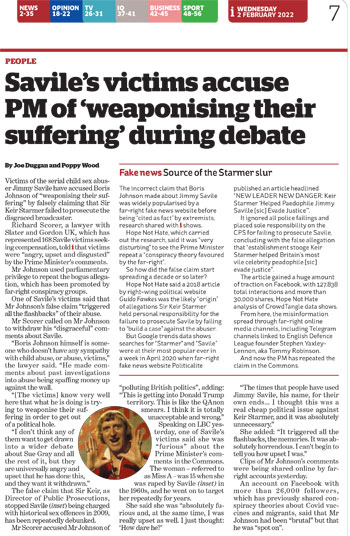
So how should the Press have handled this exchange? Ignore it? That might seem sensible if you are a news organisation that believes itself to be above unreliable, unregulated, unaccountable social media. Don’t repeat the libel and all that. But it would also be a bit daft. The i, Mirror and Metro all reported Savile victims’ anger at having their suffering “weaponised” to score political points; the Guardian and the Telegraph focused on the Speaker’s censure. The Times ran a panel headlined, “No regrets on Savile claim”, which felt as though it was putting Johnson’s defence case, until you read the first sentence: “Boris Johnson says he ‘stands by’ false comments he made in the Commons yesterday…” Very CNN.
The Sun carried a double-column story headlined “Dig at Keir on Savile ‘valid’”, based on an interview with Johnson on his Ukraine trip (more of that later) in which he said: “As far as I’m aware, it’s fairly accurate.” Fairly accurate? Is that sufficient for a prime minister to traduce an opponent these days? But while he got the headline and that remark near the top, almost all of the rest of the Sun’s 11-par story was devoted to a raft of people, including Dominic Raab and former Tory minister Julian Smith, criticising him. No one else was quoted in his defence.
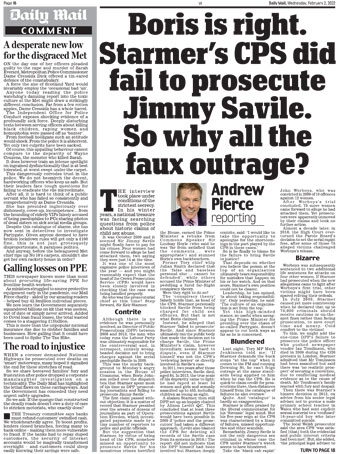
But then in came the Mail roaring to the rescue, with a news story headlined “Boris stands by his Jimmy Savile jibe at Starmer” (notice, yet again, first name for Johnson, surname for Starmer. Can’t they at least be consistent in the same headline? And that applies to everyone, not just the Mail), backed up by a full op-ed from Andrew Pierce asking, “Why the faux outrage?” His argument answered my opening questions: in his eyes, the head of an organisation is responsible for everything that happens on their watch. And to illustrate the point, he listed some of the CPS’s shortcomings under Starmer.
Meanwhile, the Mail continues to support Boris Johnson’s continued tenure at No 10.
Can’t they at least be consistent in the same headline? And that applies to everyone, not just the Mail.
Singling out Sunak
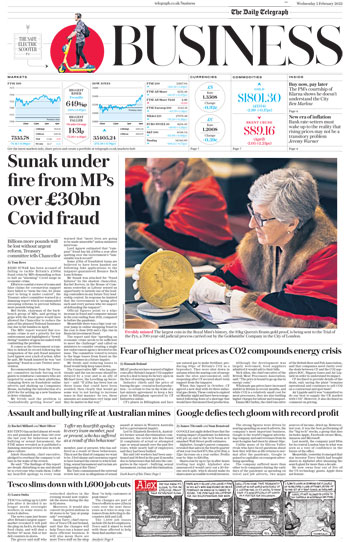
Talking of responsibility, who should carry the can for the £8.7bn “wasted” on PPE that wasn’t up to scratch, past its use-by date or is no longer worth a fraction of what we paid for it? Or the £4.3bn lost in Covid loans fraud? The Prime Minister, as being in overall charge, even though he won’t have been involved in any of the expenditure? Matt Hancock? Rishi Sunak?
Yesterday’s Express splashed on the £8.7bn, the Mail added the two sums together to come up with £13bn, which would, coincidentally, cover the first year’s income from the NI rise due in April (more of that below), the FT put the PPE losses at just under £10bn by including write-downs for contracts that couldn’t be cancelled.
The Telegraph didn’t run the story on its news front, preferring HRT being sold over the counter, but it did carry a nib pointing to the business lead, which was headlined “Sunak under fire from MPs over £30bn Covid fraud”. That was an interesting interpretation, to say the least. No. The Telegraph hadn’t uncovered a further £26bn of Covid fraud – the figure related to all fraud. And while the Treasury Committee report on which the story (and the Express, Mail and FT splashes) was based expressed dissatisfaction with the Government, there appeared to be no direct criticism of the Chancellor by name – either in the report or by people reacting to it. So was it fair to hold Sunak alone culpable, particularly since the report noted that “several” departments besides the Treasury were involved in government policy on fighting financial crime – including the Home Office, Ministry of Justice, HMRC and the Department for Business, Energy and Industrial Strategy?
That last department is also responsible for the British Business Bank, which distributes money from the Future Fund. I mention this because the Telegraph’s business section has been gunning for Sunak over that, too. Its splash on Monday was “Sunak pours taxpayer cash into online betting firm”.
Now, I’m no expert on this. But I rather thought the Chancellor’s job was to gather in the money as best he can and then dole it out to various government departments to spend on their projects. Eat out to Help Out was definitely Sunak’s baby and the faults in the way the scheme was devised and run can legitimately be laid at his door. But the Future Fund and which start-ups it supports? Am I being naïve? Is the Telegraph being unfair?
Save Boris, Stop Rishi
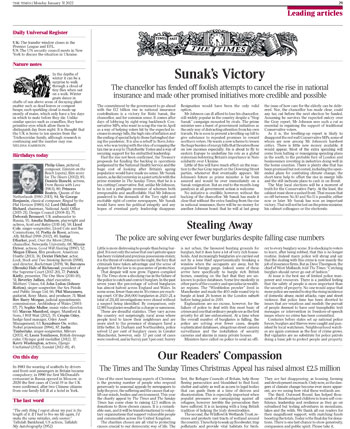
Or is this the “Save Boris, Stop Rishi” snowball? My suspicions that it may be the latter are aroused by the Times, which, although it has yet to call for the Prime Minister to quit, appears to be positioning itself to back the Chancellor in any forthcoming leadership election. On Monday it ran an editorial headlined “Sunak’s victory” in which it praised the Chancellor for his common sense in refusing to reverse the NI increase. It accepted Sunak’s assertion that he was a tax-cutting Conservative, adding, “But, unlike Mr Johnson, he is not a profligate promiser of schemes both irresponsible and unaffordable.”
It then took a swipe at the Mail and its “spike the hike” campaign saying: “Had Mr Johnson pandered to the demands of the Tory right and excitable right-of-centre newspapers, Mr Sunak would have seen his political integrity and any hopes of eventual party leadership disappear. Resignation would have been the only valid option.
Mr Johnson can ill afford to lose his chancellor, still widely popular in the country despite a ‘Stop Sunak’ campaign mounted by rivals.”
On Tuesday, only it and Metro reported that LibDem Alistair Carmichael had asked the UK Statistics Authority to investigate a “gross misrepresentation” of crime figures by Johnson and Priti Patel. Johnson claimed in his Commons statement that it had fallen by 14% since he took office, but he didn’t say that excluded fraud, which – as we have seen – soared through the pandemic, so that there had actually been a 14% increase in crime overall.
Then yesterday we had that “CNN moment” on the Starmer slur.
And so we see the Conservative-leaning Press divided, with the Mail and Express sticking by Johnson, the Telegraph still adding fuel to the flames (another party disclosure yesterday) but not yet ready to ditch its boy, and the Times wishing him gone but not ready to push him. How long before Mr Murdoch urges his troops to come all out for dishy Rishi?
The Mail’s shopping list
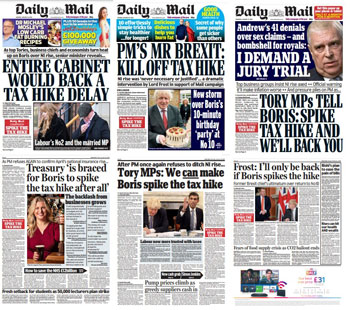
That is not, however, to say that the Mail is offering unconditional support. As we saw last time, it has a shopping list: clipping the BBC’s wings, ending covid restrictions for starters. With both of those promised, it looked as though it was on a roll. It also wants an end to the “net zero folly” and, most urgently, the scrapping of the NI increase. Here it is enjoying less success.
Last week the paper ran successive splashes as part of its “spike the hike” campaign, so it must have been galling to see the Sunday Times come out with a joint-bylined piece from the Prime Minister and Chancellor insisting that the tax rise would go ahead. But the Mail is never one to give up easily. Its response to that was, “Tory anger as PM confirms tax rise”, in which four MPs are quoted as wanting it delayed. There will be more who agree with them; an earlier story talked about “several”.
Only Graham Brady knows how many MPs have written seeking a vote of no confidence in the Conservative leader, but it is generally thought to be more than “several”. Yet we have yet to see a Mail splash or spread headline “Tories demand PM quits”. Instead, this morning, after three more letters went in, it reported on Devon MPs “plotting” in “what was dubbed (by the Mail) the Cream Tea Coup”.
A touch of Frost

One of those splash stories last week was “PM’s Mr Brexit: kill off tax hike”. This was, the subhead declared, a “dramatic intervention by Lord Frost in support of Mail campaign”. Was this a coup? Well, I guess it depends on where you stand on who is qualified to express an opinion.
As we know, the Mail is not keen on unelected judges expressing opinions on matters of law – which is their job.
Nor is it keen on unelected peers interfering with the legislative process – which is their job.
And, indeed, nor should politicians honour their cronies or appoint them to positions of influence.
Yet here we have a man who has never troubled the electorate and with no known expertise in fiscal policy, a man ennobled by his friend the Prime Minister, being given front-page billing for his thoughts on tax. This could surely not be because they happen to chime with those of the Daily Mail?
The Mail is not alone in giving Frost space to air his views – the Telegraph is also a devotee – but it does seem the most assiduous. He was back again on Monday with “Frost: I’ll only be back if Boris spikes the hike”. This, the paper said, was his “ultimatum” over a return to No 10 as chief of staff. But who says he’s going back to No 10? The basis for the story appears to be a tweet by the man himself “given the mild speculation about my aspirations”. So somebody started a rumour, he responded to it by saying “not going back there because I don’t agree with his policies” and that becomes an “ultimatum” for a return that we don’t even know was being sought in the first place.
Right.
Meanwhile over at the Telegraph, “top civil servant” Antonia Romeo has “rejected” the new role of permanent secretary at No 10. Blimey, that was quick. Johnson only announced the coming revamp on Monday and already someone’s been offered the job? No. Just as Frost hasn’t, so far as we know, been asked to be the chief of staff, nor has Romeo been offered the permanent secretary job. She’s just decided not to apply for the vacancy when it becomes available.
Process-driven

It would be an understatement to say that Boris Johnson has been ubiquitous this past fortnight, and you have to admire the man’s stamina. There was that article with Rishi for the Sunday Times and another on Brexit benefits for the Mail. Then there was his interview with the Sun’s Harry Cole on the plane to Ukraine. An exclusive interview, his first since the Sue Gray “update” was published. In it, he acknowledged that if he were fined for breaking lockdown rules, he’d have to admit as much because he “did not believe it would be a secret for very long”. And, as far as telling insights go, that was about the long and short of it.
But this spread was a piece of such pure gold that I make no apology for reproducing a chunk of it, as published, and leaving you to decide whether this is the Sun being proud of its “scoop”, supportive of the PM – or twisting the knife.
“It was his first interview since Whitehall official Sue Gray slammed the "failure of leadership" in Downing Street in a partly published report on Partygate.
The PM insisted he had told Parliament everything he had to say on the subject for now in a bruising two hours of questioning from MPs on Monday.
Denying he was swerving tough questions, the PM insisted: "I did not. What are you talking about?"
Asked repeatedly about Partygate, he insisted: "I literally cannot give any commentary on that until the process concludes."
He then went on to say: "You'll have to wait for the process."
When asked if he had spoken to the cops or expected to have to speak to them, the PM said: "We need to let the process continue."
Questioned on whether he could survive in his role if fined by police for breaking his own rules, he insisted: "There's a process under way, it would be wrong for me to interrupt that."
The Sun enquired if he was going to amend incorrect claims to the Commons last year that there were no parties and all Covid guidance was followed correctly in No10.
But Mr Johnson again said: "You've got to wait for the process."
What doesn’t kill you…
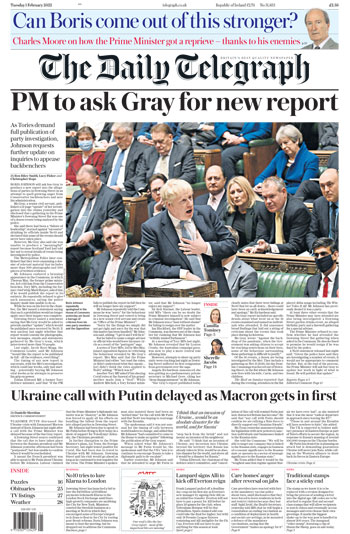
The Sun naturally puffed its interview on the front, with a picture of Mr and Mrs Johnson under the titlepiece and a little story headlined “PM: if fined I’ll own up”. I think that would satisfy the trades descriptions act.
I’m less sure about the Telegraph’s above-the-title come-on: “Can Boris come out of this stronger?” This, coupled with the underline “Charles Moore on how the Prime Minister got a reprieve – thanks to his enemies”, directed readers to a page 15 piece by its former editor. This held that Johnson had had a lucky escape because of the combination of the civil service and police inquiries that, he said, had been sought by his enemies.
The redacted Gray report had left Starmer without ammunition and made it easy for Johnson simply to say “sorry”. What Moore did not do in his brief musings on the subject was answer the question of whether the Prime Minister would finally emerge stronger. Rather, he concluded that he had been handed a reprieve that not all his colleagues believe he deserved, that he had survived and – with an implied “for now” – “looked slightly stronger than before”.
It does make you wonder if the best thing you’ve got to sell your paper is an over-interpreted headline based on five paragraphs at the foot of the letters page.
Story first

A key part of Operation Save Big Dog or Operation Red Meat or whatever it’s called this week was the launch of the Levelling Up programme, with Michael Gove going walkabout in Skegness or Cleethorpes or some other blustery left-behind coastal town. Much has been written about the vagueness of the Levelling Up agenda. Some of it may have been justified. But when the Government finally spells out what it intends doing, I’m old-fashioned enough to believe that you should tell the story first and give the reaction afterwards.
It doesn’t have to be couched in “The world is going to be wonderful” terms, as is often the case with the Express in particular. But it absolutely shouldn’t be “Levelling up drive is ‘new slogans without new ideas’, says Labour”, as served up by the Guardian yesterday.
Even worse was the Mirror’s “Just about their level”, which appeared in the slot next to the leader that most tabs reserve for their political commentary. But this wasn’t commentary. It was a news report and, as such, should have had a news, not opinionated, headline.
Targeting the Blob

It’s not only Tory MPs who are waiting for Sue Gray; broadcasters are too. But for a different reason. She is overseeing the new selection process for the next chairman of Ofcom. This is being re-run because the previous panel was unable to come up with a candidate acceptable to the Culture Secretary or the Prime Minister.
As has been widely reported, Paul Dacre was favourite for the job, but was deemed “unappointable” after his interview. When the Government decided to start afresh, he ruled himself out of the new process, announcing his retreat in a letter to the Times in which he described his “infelicitous dalliance with the Blob” – in other words, the Civil Service. He also said that he was looking forward to a new challenge in the private sector, which turned out to mean his return to the Mail.
On Monday, the paper carried a small downpage item reporting that Lord Grade might go for the post, which seemed a reasonable sort of story, given his broadcasting track record – and his age (he’s 78). But the thing that struck me was the sentence that said, “Paul Dacre, Boris Johnson’s first choice for the role, pulled out of the race last year after civil servants originally blocked his bid.” This was presented as an absolute fact.
The selection panel that rejected Dacre was comprised of Sarah Storey, director-general of the DCMS, which has responsibility for Ofcom; Paul Potts, a former PA journalist who is now an independent director of Times Newspapers; Melanie Richards, the deputy chairman of KPMG, and Lord Livingston, a Conservative peer who used to run BT. So one civil servant – albeit the chair – on a panel of four. One wonders what Potts, Livingston and Richards think of the suggestion that, with their combined leadership experience, they are so feeble-minded that had they wanted to appoint Dacre, they would have been outflanked by civil servants.
Funnily enough, it wasn’t Storey who was seen as the scuppering civil servant, but the permanent secretary Sarah Healey. And guess who turned up as a case study to run alongside a Mail splash on “Whitehall fat cats”? Well, she advocates working from home, she likes her Peloton. So it was obvious really, wasn’t it? And if further indictments were needed, she attended the Brit awards, a couple of football matches and had lunch with the chairman of the BBC. Because none of those was remotely relevant to her work as the most senior civil servant in the department responsible for the arts, sport and broadcasting.
She was back again today, maybe perhaps possibly lining herself up for that No 10 permanent secretary job that Antonia Romeo doesn’t want. She’s been seen in Downing Street a lot lately. Never matter that officials say that’s because she’s helping staff accused over the parties in her role as Civil Service wellbeing champion. It’s an excuse not only for more thinly based speculation à la Frost, but also to run that same picture of her lugging her bags down the street and have another go at her for liking her Peloton and WFH.
And if further indictments were needed, she attended the Brit awards, a couple of football matches and had lunch with the chairman of the BBC.
What’s in a name?

Pub quiz time. What is the capital of China? Where is the Bollywood film industry based? Of which country is Aung San Suu Kyi the deposed leader? What is the capital of Ukraine?
Most newspapers would agree that the answers to the first three are Beijing, Mumbai and Myanmar. But Ukraine? Is it Kiev or Kyiv?
For the Express, Sun, Mail and Star it’s still Kiev. For the FT it is unequivocally Kyiv, and has been for more than two years. Others have been inconsistent – the Guardian also officially switched in 2019, although Kiev was still slipping through for the city rather than the chicken dish until last month – but the movement is now firmly towards Kyiv. The Times, Telegraph, Mirror and i, all of which had used it occasionally over the past couple of years, made what looks like the definitive leap over the past week.
Isn’t this confusing for the reader (or viewer, since broadcasters have also switched)? It has certainly irritated Richard Littlejohn, who wrote that he could only assume the new usage was “yet another example of intellectual snobbery”.
Well, not quite. It seems more political than that. A gesture of solidarity for a country under threat from its giant neighbour. It’s been a long time coming – Ukraine first made Kyiv its “official” English-language spelling nearly 20 years ago, but people carried on using Kiev regardless. Until Ukraine last hit the world’s headlines in 2019. That’s when the FT and the Guardian changed their style and others started to use the new formation – perhaps influenced by the institutions with Kyiv in their title, not least the Dynamo football club.
We know from Peking, Bombay and Burma that some people and organisations are reluctant to let go of the familiar names, but equally that we can be sure that everyone will eventually adopt Ukraine’s preferred translation. In the meantime, it would be nice if media outlets would let readers into their thinking. I look forward to reading Rose Wild’s explanation in her Feedback column in Saturday’s Times.
We can be sure that eventually everyone will adopt Ukraine’s preferred translation.
Barry Cryer

A few weeks ago, I was bemoaning the lack of front-page coverage of the death of Sidney Poitier, particularly in the Times. Any unspoken suspicion that there might be a racial element to the omission appeared to be allayed when Meatloaf was similarly overlooked. Maybe it’s just not into old people dying.
It did, however, have room for a front-page story about Barry Cryer, thank goodness.
The point of this note, though, is not to criticise the Times, but to commend the Telegraph. It not only got it exactly right for its Radio 4-listening readership by making Cryer its main picture, but did so spectacularly by choosing this joyous photograph. Spot on.
Celebrating old age

The Times may not be into old people dying, but at least it’s not averse to old people who are still alive. On the day of that glorious Telegraph Cryer picture, the Thunderer went for a triptych of 75-year-old Donald Trump playing golf. And yesterday we had 87-year-old Judi Dench looking wonderful in a long red coat – one of “25 stars in Vogue’s award season edition”. We can be fairly sure that she’ll be back in the same slot if she wins a Bafta, Golden Globe or Oscar for her role in Kenneth Branagh’s Belfast. For Dench is one of the Times’s favourites, having appeared in about a dozen stand-alone front-page pictures or puffs in recent years.
But she’s still lagging behind Helen Mirren, a mere whippersnapper at 75.
Front page of the fortnight
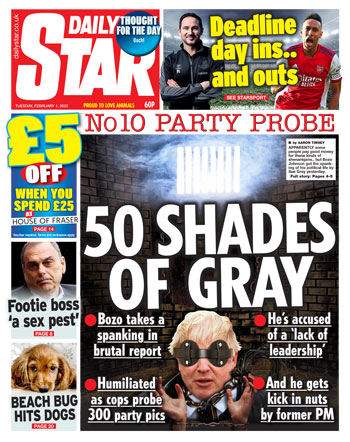
For a while during the pandemic it felt as though the Daily Star was the only paper saying what many people were thinking about the Government and it produced a series of wittily biting covers, most notably about Dominic Cummings and his Barnard Castle jaunt.
The comic style has seemed a bit laboured at times, but maybe this week’s pun on the Sue Gray report – even it it’s stretching a point to describe it as “brutal” – signals a return to form.
Liz Gerard’s Notebook is a fortnightly column published in the InPubWeekly newsletter. To be added to the mailing list, enter your email address here.












